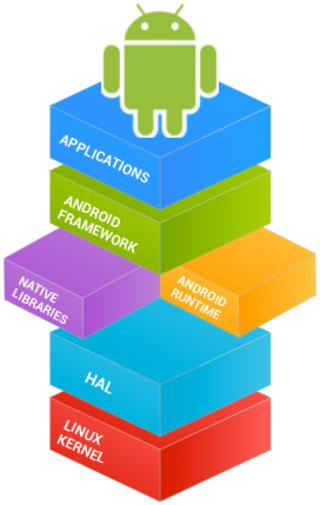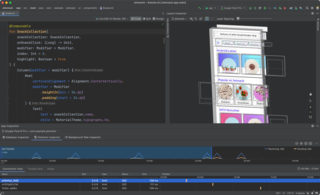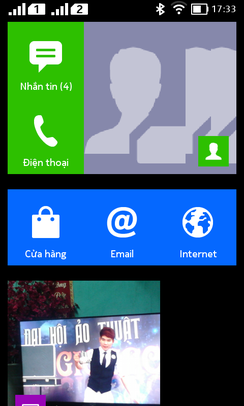
Adobe AIR is a cross-platform runtime system currently developed by Harman International, in collaboration with Adobe Inc., for building desktop applications and mobile applications, programmed using Adobe Animate, ActionScript, and optionally Apache Flex. It was originally released in 2008. The runtime supports installable applications on Windows, macOS, and mobile operating systems, including Android, iOS, and BlackBerry Tablet OS.

Android is a mobile operating system based on a modified version of the Linux kernel and other open-source software, designed primarily for touchscreen mobile devices such as smartphones and tablets. Android is developed by a consortium of developers known as the Open Handset Alliance, though its most widely used version is primarily developed by Google. It was unveiled in November 2007, with the first commercial Android device, the HTC Dream, being launched in September 2008.
The Android SDK is a software development kit that includes a comprehensive set of development tools. These include a debugger, libraries, a handset emulator based on QEMU, documentation, sample code, and tutorials. Currently supported development platforms include computers running Linux, Mac OS X 10.5.8 or later, and Windows 7 or later. As of March 2015, the SDK is not available on Android itself, but software development is possible by using specialized Android applications.
A mobile development framework is a software framework that is designed to support mobile app development. It is a software library that provides a fundamental structure to support the development of applications for a specific environment.

ChromeOS, sometimes styled as chromeOS and formerly styled as Chrome OS, is a Linux-based operating system developed and designed by Google. It is derived from the open-source ChromiumOS and uses the Google Chrome web browser as its principal user interface.

The Android Debug Bridge is a programming tool used for the debugging of Android-based devices. The daemon on the Android device connects with the server on the host PC over USB or TCP, which connects to the client that is used by the end-user over TCP. Made available as open-source software under the Apache License by Google since 2007, features include a shell and the possibility to make backups. The adb software is compatible with Windows, Linux and macOS. It has been misused by botnets and other malicious software, for which mitigations were developed such as RSA authentication and device whitelisting.

Android software development is the process by which applications are created for devices running the Android operating system. Google states that "Android apps can be written using Kotlin, Java, and C++ languages" using the Android software development kit (SDK), while using other languages is also possible. All non-Java virtual machine (JVM) languages, such as Go, JavaScript, C, C++ or assembly, need the help of JVM language code, that may be supplied by tools, likely with restricted API support. Some programming languages and tools allow cross-platform app support. Third party tools, development environments, and language support have also continued to evolve and expand since the initial SDK was released in 2008. The official Android app distribution mechanism to end users is Google Play; it also allows staged gradual app release, as well as distribution of pre-release app versions to testers.

Google Play, also known as the Google Play Store and formerly the Android Market, is a digital distribution service operated and developed by Google. It serves as the official app store for certified devices running on the Android operating system and its derivatives, as well as ChromeOS, allowing users to browse and download applications developed with the Android software development kit (SDK) and published through Google. Google Play has also served as a digital media store, offering games, music, books, movies, and television programs. Content that has been purchased on Google Play Movies & TV and Google Play Books can be accessed on a web browser and through the Android and iOS apps.

Sailfish OS is a Linux-based operating system based on free software, and open source projects such as Mer as well as including a closed source UI. The project is being developed by the Finnish company Jolla.

Aptoide is an online marketplace for mobile applications which runs on the Android operating system. In Aptoide, unlike the Android-default Play Store, there is not a unique and centralized store; instead, each user manages their own store. The software package is published by Aptoide S.A., a for-profit company incorporated in 2011, and headquartered in Lisbon, Portugal.

Android Studio is the official integrated development environment (IDE) for Google's Android operating system, built on JetBrains' IntelliJ IDEA software and designed specifically for Android development. It is available for download on Windows, macOS and Linux based operating systems. It is a replacement for the Eclipse Android Development Tools (E-ADT) as the primary IDE for native Android application development.
Android Runtime (ART) is an application runtime environment used by the Android operating system. Replacing Dalvik, the process virtual machine originally used by Android, ART performs the translation of the application's bytecode into native instructions that are later executed by the device's runtime environment.

The Nokia X platform was a Linux-based mobile operating system and software platform originally developed by Nokia, and subsequently by Microsoft Mobile. Introduced on 24 February 2014, it was forked from Android and used on all the devices of the Nokia X family. It was also the next Nokia Linux project after the ill-fated MeeGo.

Kali NetHunter is a free and open-source mobile penetration testing platform for Android devices, based on Kali Linux. Kali NetHunter is available for un-rooted devices, for rooted devices that have a standard recovery, and for rooted devices with custom recovery for which a NetHunter specific kernel is available (NetHunter). Official images are published by Offensive Security on their download page and are updated every quarter. NetHunter images with custom kernels are published for the most popular supported devices, such as Google Nexus, Samsung Galaxy and OnePlus. Many more models are supported, and images not published by Offensive Security can be generated using NetHunter build scripts. Kali NetHunter is maintained by a community of volunteers, and is funded by Offensive Security.
/e/ is a fork of LineageOS, an Android-based mobile operating system, and associated online services. /e/ is presented as privacy software that does not contain proprietary Google apps or services, and challenges the public to "find any parts of the system or default applications that are still leaking data to Google."

HarmonyOS (HMOS) (Chinese: 鸿蒙; pinyin: Hóngméng) is a distributed operating system developed by Huawei to collaborate and interconnect with multiple smart devices on the Internet of Things (IoT) ecosystem. In its current multi-kernel design, the operating system selects suitable kernels from the abstraction layer for devices with diverse resources. For IoT devices, the system is known to be based on LiteOS kernel; while for smartphones and tablets, it is based on a Linux kernel layer with AOSP compatibility libraries to support legacy APK apps, in addition to native HarmonyOS HAP apps via the Ark Compiler.

UserLAnd Technologies is a free and open-source compatibility layer mobile app that allows Linux distributions, computer programs, computer games and numerical computing programs to run on mobile devices without requiring a root account. UserLAnd also provides a program library of popular free and open-source Linux-based programs to which additional programs and different versions of programs can be added.
There are many apps in Android that can run or emulate other operating systems, via utilizing hardware support for platform virtualization technologies, or via terminal emulation. Some of these apps support having more than one emulation/virtual file system for different OS profiles, thus the ability to have or run multiple OS's. Some even have support to run the emulation via a localhost SSH connection (letting remote ssh terminal apps on device access the OS emulation/VM, VNC, and XSDL. If more than one of these apps that support these protocols or technologies are available on the android device, via androids ability to do background tasking the main emulator/VM app on android can be used to launch multiple emulation/vm OS, which the other apps can connect to, thus multiple emulated/VM OS's can run at the same time. However, there are a few emulator or VM apps that require that the android device to be rooted for the app to work, and there are others that do not require such. Some remote terminal access apps also have the ability to access Android's internally implemented Toybox, via device loopback support. Some VM/emulator apps have a fixed set of OS's or applications that can be supported.
Android devices have the ability to run virtual machines or emulate other operating systems. It does this either via desktop virtualization, platform virtualization, or emulation via compatibility layer.

Termux is a free and open-source terminal emulator for Android which allows for running a Linux environment on an Android device. In addition, various software can be installed through the application's package manager.












